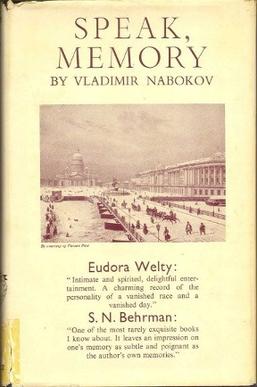.

Her intense and pure religiousness took the form of her having equal faith in the existence of another world and in the impossibility of comprehending it in terms of earthly life. All one could do was to glimpse, amid the haze and the chimeras, something real ahead, just as persons endowed with an unusual persistence of diurnal cerebration are able to perceive in their deepest sleep, somewhere beyond the throes of an entangled and inept nightmare, the ordered reality of the waking hour.
Whenever in my dreams, I see the dead, they always appear silent, bothered, strangely depressed, quite unlike their dear bright selves. I am aware of them, without any astonishment, in surroundings they never visited during their earthly existence, in the house of some friend of mine they never knew. They sit apart, frowning at the floor, as if death were a dark taint, a shameful family secret. It is certainly not then — not in dreams — but when one is wide awake, at moments of robust joy and achievement, on the highest terrace of consciousness, that mortality has a chance to peer beyond its own limits, from the mast, from the past and its castle-tower. And although nothing much can be seen through the mist, there is somehow the blissful feeling that one is looking in the right direction.
A sense of security, of well-being, of summer warmth pervades my memory. That robust reality makes a ghost of the present. The mirror brims with brightness; a bumblebee has entered the room and bumps against the ceiling. Everything is as it should be, nothing will ever change, nobody will ever die.
Speak, Memory: Vladimir Nabokov, 1951 (excerpts)
Bachalpsee in the morning, Bernese Alps: photo by ZachT, 2007
Forest area and prairie at Cooper Mountain Nature Park, Oregon: photo by Aboutmovies, 2009
Moore Nature Reserve, England: photo by andy, 2005
Mai Po Nature Reserve (panorama view): photo by Baycrest, 2009
Rozhdestveno, at Vyra, near Siverskaya, estate inherited by Vladimir Nabokov, 1916: photo by Alexey Lavrov, 2007
Speak, Memory, first UK edition cover, 1957: image by Graham Hardy, 2008




I read Speak, Memory (originally titled Conclusive Evidence--"conclusive evidence that I existed") when I was, I think, 18. I loved Nabokov in those days, his arch and somewhat pompous English style as titillating as anything in Proust or Beerbohm to my ear. A world vanished, along with his youth, the years of exile. The emancipation from an impossible past, living in it, the evocation of imaginary worlds a repudiation of the nightmare of Modernity. The living proof of his birthright as a rare surviving member of a vanquished aristocrasy. Put Pnin and Humbert Humbert together and maybe you get a sort of cracked composite of what he might have actually been like, at Cornell.
ReplyDeleteThe original title of the first published (UK) edition of this memoir, as pictured in the post, was Speak, Memory. Nabokov had submitted it as Speak, Mnemosyne, but the English publishers rejected this title as too arcane. The first American edition, released concurrently, was titled Conclusive Evidence. Nabokov wrote the book in English (indeed it is in my view a repository of some of the most shimmering, transcendent sentences in the language, maybe the greatest achievement of this master stylist ), but later expressed regret that he had not written it in Russian. He had "pictured" in in Russian, he said; for this writer, we remember, "picturing" and language were always twinned, his gift of linguistic synesthesia being justifiably renowned.
ReplyDeleteCurtis, my sense of the matter is that while Nabokov's experiences at Wellesley and Cornell obviously became part of the observed material of his work, the observations that underlie Lolita were probably gathered mostly on those butterfly collecting expeditions around the US, in which the non-driver Nabokov was chauffeured by his wife Vera, and by his experiences at Southern Oregon College in Ashland, where he taught while finishing the book. The fact that when he attempted to destroy an earlier draft, Vera stopped him, seems to me evidence that she was able to see all along that it was not in any way a "confession" but a pure comic creation, written in a mixture of his own "high" style with the "low" prose of a country where he and they would always think of themselves as alien. What Humbert Humbert and Pnin have in common indeed is the fact that they are both comic creations that share with their creator a sense of being a European problematically exiled in America.
For those who are interested in the fascinating subject of Nabokov and butterflies, by the way, there are some useful links in the comment thread here.
I posted something about dreams. Offcourse its not as telling as Vladimir Nabokov!
ReplyDeleteAnd although nothing much can be seen through the mist, there is somehow the blissful feeling that one is looking in the right direction.
This is such a sweet feeling.
Tom,
ReplyDeletePerhaps something in today's poem speaks to this ---
4.3
first grey light in cloud above shadowed
ridge, faint white moon next to branches
in foreground, waves sounding in channel
of the experience of memory,
consciousness of time
preceding one, opposed view,
what has been between
grey rain clouds against invisible ridge,
wingspan of cormorant flapping toward it
I am astonished at the first paragraph. I was thinking about that image just two days ago. The same question crossed my mind: why are we so afraid of what happens after death if we become from as dark a place we dwelled in before our birth and are not afraid of it at all even if we cannot remember a thing?
ReplyDeleteCarl Jung was right, after all.
So much of what we see in dreams and in waking is seen as if in a mist, so much of the time -- yes, Aditya.
ReplyDeleteAnd then there are these wondrous moments of clarity -- in language.
If, that is, the language is as intensely wrought as this writing of Nabokov's.
I think this writing does reckon with that unfathomable sense of the forelife, as Lucy speaks of it in reference to Jung.
And are we not, young and old, all of us, always involved with, as Steve's poem has it,
the experience of memory,
consciousness of time